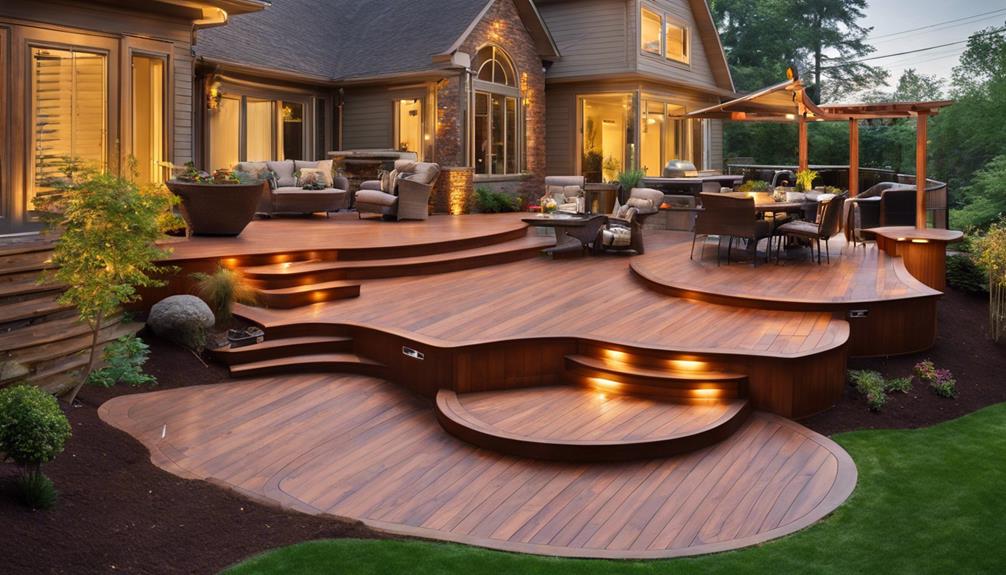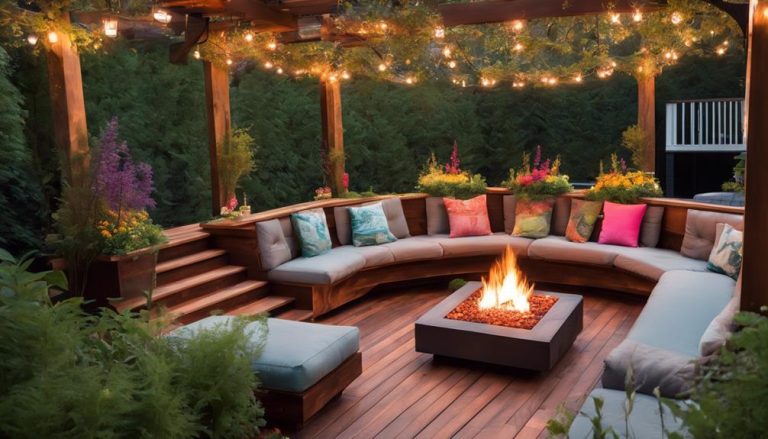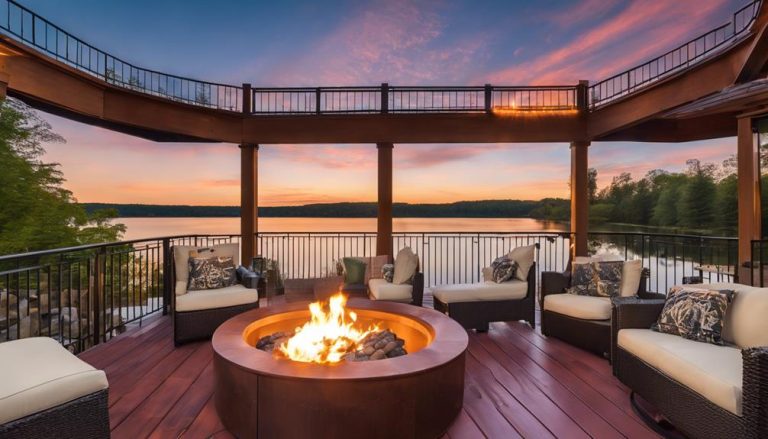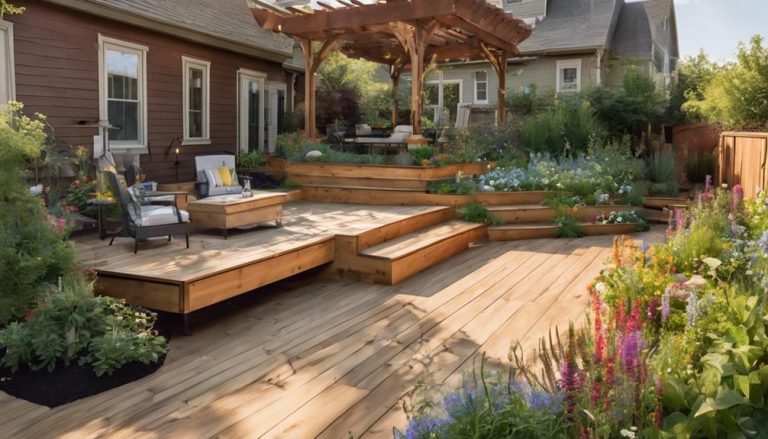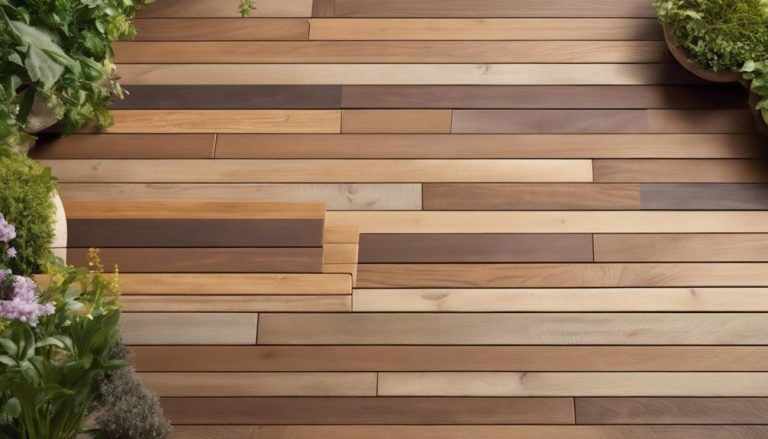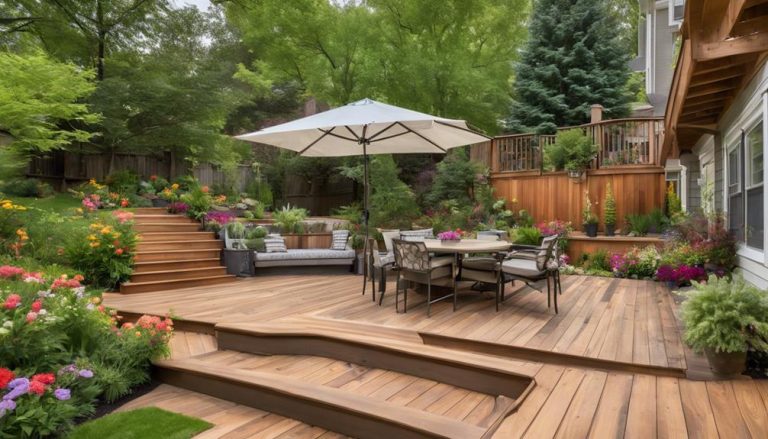Roundup of Top Custom Deck Design Inspirations
Custom deck design inspirations today marry aesthetic elegance with practical functionality, focusing on key elements such as spatial layout, structural integrity, and seamless integration with the environment. Exotic hardwoods, high-performance composites, and eco-friendly materials like bamboo are prevalent choices that enhance durability while reducing maintenance needs. Personalization elevates outdoor spaces, incorporating features such as built-in seating and outdoor kitchens, ensuring they cater to unique homeowner visions and local climate needs. These attributes not only increase property value by differentiating homes in competitive markets but also enhance living experiences. By exploring these design principles, further insights into creating a harmonious outdoor retreat await.
Deck Builder Highlights
- Embrace eco-friendly designs with bamboo or recycled materials for a sustainable deck.
- Incorporate built-in features like seating or planters for integrated functionality.
- Utilize exotic hardwoods and tempered glass for a luxe aesthetic.
- Blend indoor-outdoor spaces seamlessly for enhanced living experiences.
- Personalize designs by reflecting individual tastes and local climate considerations.
Defining Custom Deck Design
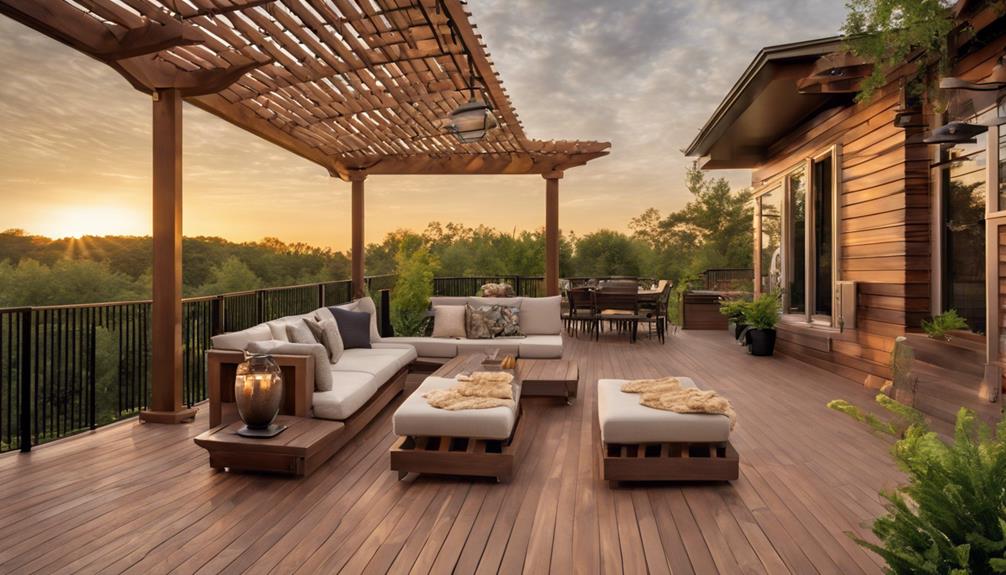
Custom deck design extends beyond conventional decking layouts by focusing on key design elements that harmonize functionality with aesthetic appeal, creating outdoor spaces that reflect individual lifestyle tastes. By incorporating unmatched expertise in outdoor projects, designers guarantee that the unique vision of each homeowner is brought to life, blending seamlessly with the natural surroundings.
Key Design Elements
Every successful custom deck design is built upon a foundation of key design elements that guarantee functionality, aesthetics, and structural integrity. To achieve this, designers must consider factors such as spatial layout, circulation patterns, and integration with the surrounding environment. Establishing a harmonious relationship between the deck and its context ensures that the overall design complements the existing architecture and landscape, enhancing the property's visual appeal.
Moreover, attention to scale and proportion is vital when articulating a custom deck design. Designers endeavor to achieve a balance that aligns with the dimensions of both the home and the outdoor space, optimizing usability while maintaining visual coherence. Effective zoning is another pivotal component, facilitating diverse activities such as dining, lounging, and entertaining, each with its distinct area but still part of a unified whole.
Lighting serves not only a functional role but also amplifies the ambiance, extending usability into the evening hours. Additionally, consideration of safety elements, such as railings and non-slip surfaces, fortifies the structural integrity of the design. By thoughtfully incorporating these elements, a custom deck design can provide a tailored, inviting outdoor space that adheres to the highest standards of beauty and practicality.
Choosing Unique Materials
In the domain of custom deck design, selecting unique materials is paramount in defining the character and individuality of the space. The choice of materials not only enhances aesthetic appeal but also plays a pivotal role in the functionality and longevity of the deck. From exotic hardwoods like Ipe or Balau, known for their durability and rich textures, to high-performance composites, each material brings its distinctive attributes to the design. Innovative materials such as bamboo offer eco-friendly alternatives, providing a sustainable option without compromising on strength or visual allure.
The custom deck's foundation can be further enriched through the incorporation of modern elements such as tempered glass railings, which provide a sleek, unobstructed view of the surroundings. Metal accents, crafted from aluminum or stainless steel, introduce an industrial touch, standing steadfast against the elements.
For those seeking an artistic flair, integrating stone or tile inlays into the decking surface can create focal points that captivate attention, contrasting beautifully with wood or composite backgrounds.
Ultimately, choosing unique materials transforms a deck into a personalized haven, aligning aesthetic desires with practical considerations, while meticulously curated selections signify each custom deck as an embodiment of innovation and craftsmanship.
Personalizing Outdoor Spaces
Emphasizing the personalization of outdoor spaces, a custom deck design extends beyond mere construction to reflect the unique lifestyle and preferences of its owner. It transforms an otherwise generic area into a tailored sanctuary that celebrates individuality, offering homeowners an outdoor retreat that complements their personal aesthetic. The process begins by engaging with professional designers to brainstorm layouts and features that align with the homeowner's vision, incorporating elements such as built-in seating, planters, and lighting fixtures that enhance usability and ambience.
Consideration of local climate and landscape plays a pivotal role in shaping a deck's functionality and sustainability. Selecting materials that harmonize with the surroundings while ensuring durability against weather variations is essential. This includes options like weather-resistant woods or innovative composite materials that offer low maintenance benefits.
Customization extends beyond structural components to incorporate decor elements—such as outdoor kitchens or fire pits—that foster year-round usage. Incorporating technology, such as automated lighting systems or built-in sound systems, further elevates the experience, making the outdoor space an extension of the home's living area. By thoughtfully integrating these features, homeowners can create distinctive environments that offer comfort, functionality, and aesthetic appeal tailored to their taste.
Benefits
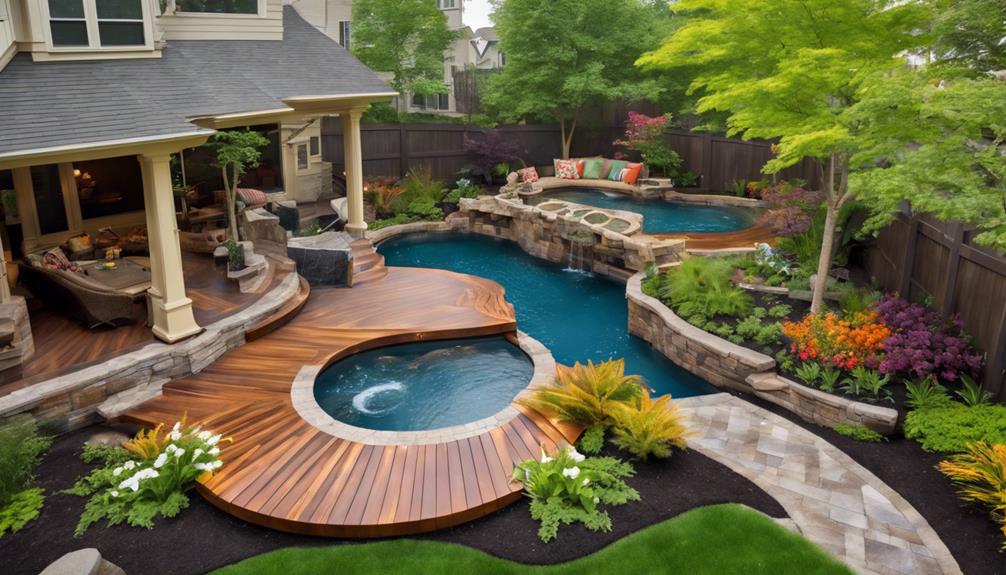
Exploring the benefits of custom deck design reveals significant advantages that extend beyond mere aesthetics. An enhanced outdoor living space offers a comfortable area for relaxation and entertainment, while also increasing a property's market value.
Additionally, the natural resistance to rot and decay found in cedar decks guarantees longevity with low maintenance requirements. Moreover, with personalized aesthetic appeal and eco-friendly design options, homeowners can create environmentally responsible spaces that reflect their unique styles and sustainability preferences.
Enhanced Outdoor Living Space
A custom-designed deck can tremendously elevate your outdoor living space, offering an array of benefits that enhance both aesthetic appeal and functional utility. Combining architectural ingenuity with nuanced craftsmanship, a tailored deck seamlessly integrates into the landscape, creating an extended area for relaxation and entertainment.
Beyond mere physical expansion, such a deck establishes a harmonious shift between the indoor and outdoor settings, effectively blurring the lines to craft a continuous living space.
The design possibilities are virtually limitless, enabling homeowners to curate a space that aligns perfectly with lifestyle and personal taste. Featuring elements like built-in seating, lighting fixtures, and outdoor kitchens, these decks extend the comfort of indoor amenities into the open-air environment.
This enhanced outdoor living space provides a versatile canvas for gatherings, dining, or quiet reflection, enriching the quality of everyday life by fostering a stronger connection with nature.
Moreover, the strategic use of materials—ranging from resilient hardwoods to low-maintenance composites—ensures longevity and requires minimal upkeep, allowing more time for enjoyment. Weather-resistant and customizable, a custom deck invites year-round usability, becoming an ever-present sanctuary for rest and recreation amidst the demands of modern living.
Increased Property Value
Investing in a custom-designed deck substantially enhances property value, serving as a highly desirable feature among potential homebuyers. This structural addition not only augments the aesthetic appeal of a residence but also provides tangible financial benefits. Research indicates that homeowners can expect a favorable return on investment (ROI) for the addition of a custom deck, often recouping a significant portion of the initial expenditure upon sale.
Moreover, a custom deck differentiates a property in competitive real estate markets, providing a distinctive allure that can boost marketability. Prospective buyers frequently view such outdoor enhancements as advantageous, perceiving them as extensions of living space that invite a multitude of outdoor activities, from relaxing in solitude to hosting gatherings. This perceived added utility can entice offers at a higher price point, effectively increasing the final transaction value.
Additionally, the customization aspect guarantees that the deck aligns with the architectural style of the home, creating a seamless integration that enhances curb appeal. This harmonious blend of aesthetic and functional enhancements positions properties with custom decks as more favorable investments, elevating their status while simultaneously improving the everyday living experience of current occupants.
Personalized Aesthetic Appeal
Tailoring a deck to reflect one's personal taste offers numerous benefits, enhancing not only the property's visual elegance but also its uniqueness. The integration of personalized aesthetic elements into deck design allows homeowners to mirror their individual style through careful selection of materials, finishes, and layouts. By leveraging customizable features such as intricate railings, bespoke floor patterns, or unique lighting configurations, a deck evolves beyond a mere outdoor platform into a distinct living space that resonates with the personal ethos of its owner.
A personalized deck not only elevates the property's external charm but also provides emotional satisfaction and an inviting atmosphere. This bespoke approach to design frequently involves meticulous planning and collaboration with design professionals to guarantee that the selection of color schemes, furnishings, and architectural accents coalesce into a harmonious ensemble. This collaborative process also often incorporates blending current trends with timeless elements, ensuring the deck remains aesthetically relevant across changing seasons and styles.
Moreover, personalized decks foster a sense of ownership and pride, underscoring the property's individuality. By aligning the deck's aesthetic with the homeowner's personal inclinations, the space becomes both a visual manifestation of personality and a functional extension of the home, enhancing everyday living and social engagements.
Eco-Friendly Design Options
Embracing eco-friendly design options for decks presents significant benefits, both environmentally and economically. These sustainable practices focus on reducing the carbon footprint by utilizing materials that are responsibly sourced and designed to last longer, thereby decreasing the demand for frequent replacements and minimizing waste. By integrating recycled or renewable materials such as bamboo, reclaimed wood, or composite decking made from recycled plastics, homeowners can contribute to the conservation of natural resources while enjoying the aesthetic appeal these materials offer. Additionally, such decks often require less maintenance, reducing the need for harmful chemicals and frequent treatments that can seep into the soil and aquatic environments.
From an economic perspective, investing in eco-friendly deck designs can result in long-term savings. The durability and low maintenance nature of sustainable materials often translate into lower costs over time. Energy-efficient lighting or the integration of solar-powered features further enhance the eco-friendliness of the deck, while offering potential reductions in utility costs. Accordingly, adopting these design options can enhance property value as eco-conscious features are increasingly sought after by potential buyers. In addition, opting for eco-friendly deck designs not only supports environmental sustainability but also provides financial benefits for homeowners.
Material Selection Considerations
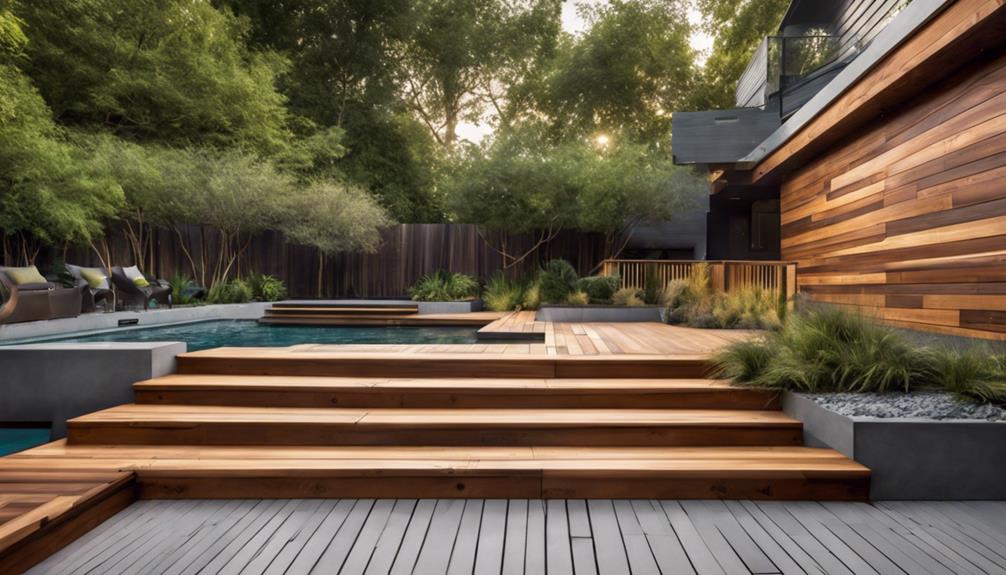
When considering materials for a custom deck, important factors such as the choice between wood and composite, eco-friendliness, and long-term durability with maintenance requirements must be carefully evaluated. Wood decks offer a classic aesthetic but may require more upkeep and are less environmentally sustainable compared to composites, which can offer benefits such as resistance to decay and reduced maintenance. The table below highlights these key differences to assist in informed decision-making:
| Material Type | Eco-Friendliness | Durability & Maintenance |
|---|---|---|
| Wood | Moderate | High maintenance |
| Composite | High | Low maintenance |
| Recycled | Very High | Variable |
| Pressure-Treated | Low | Moderate maintenance |
| Tropical Hardwood | Low | Moderate maintenance |
Careful consideration of these attributes can guide homeowners in selecting the best material suited to their aesthetic desires and practical needs, ensuring the deck is a harmonious addition to their outdoor living space.
Wood vs. Composite
Choosing between wood and composite materials for your custom deck requires a careful evaluation of various factors that can substantially impact both the aesthetics and functionality of your outdoor space.
Wood, a timeless pick, often appeals with its natural beauty and rich texture, enhancing an organic feel that seamlessly integrates with the surrounding environment. Hardwood varieties such as cedar, redwood, and tropical hardwoods offer durability and a high-end visual appeal. However, wood's susceptibility to splintering, warping, and the demands of regular maintenance—such as staining and sealing—may deter some homeowners seeking lower upkeep.
Composite materials, comprising a mix of wood fibers and plastic, present a modern alternative that emphasizes longevity and minimal maintenance. These materials resist fading, staining, and insect infestations more effectively than wood. Additionally, composite decks offer versatility in color and texture without sacrificing structural integrity, although they often come at a higher upfront cost.
Ultimately, the decision hinges on weighing the long-term goals for your deck against immediate budget constraints and personal preferences. For those prioritizing minimal maintenance and consistent appearance, composite may be more attractive, whereas purists who cherish natural aesthetics may lean toward wood despite the upkeep it necessitates.
Eco-Friendly Options
Considering the broader impact of your material choice on the environment can guide you towards more sustainable decking options. Opting for eco-friendly materials not only reduces the carbon footprint but also supports biodiversity and resource conservation.
One prominent choice is reclaimed wood, which minimizes deforestation by reusing pre-existing materials. This not only provides a rustic, authentic aesthetic but also upholds environmental principles by giving life to wood that would otherwise contribute to waste streams.
Another viable option is bamboo, known for its rapid growth and regeneration. Bamboo offers a strong and flexible alternative comparable to traditional hardwoods but requires less energy and resources to cultivate and harvest. Meanwhile, recycled plastic lumber offers an innovative solution by repurposing discarded plastics to produce robust decking materials. This selection embodies the essence of an eco-conscious approach by diverting tons of plastic waste from landfills and oceans while presenting a durable decking solution.
Additionally, choosing Forest Stewardship Council (FSC)-certified wood verifies that the timber is sourced from responsibly managed forests. By leveraging eco-friendly materials in decking projects, homeowners can greatly contribute to environmental sustainability, harmonizing aesthetic aspirations with ecological stewardship.
Durability and Maintenance
A critical factor in selecting materials for custom deck designs is the balance between durability and maintenance requirements. The longevity of a deck greatly depends on the material chosen, necessitating a consideration of factors such as weather resistance, susceptibility to wear, and maintenance demands. Wood, traditionally favored for its aesthetic appeal, typically requires regular sealing and staining to prevent damage from moisture and UV exposure. This need for recurrent upkeep could detract from its long-term durability if not meticulously managed.
Conversely, composite materials—comprising plastic and wood fibers—present an alternative with enhanced resilience and lower maintenance. These materials resist rot and insect damage while providing a wood-like appearance without necessitating frequent maintenance. Additionally, newer variations of composite decking offer improved resistance to fading and staining compared to earlier models, making them a superior choice for those seeking longevity with minimal effort.
Further options include tropical hardwoods like Ipe and Teak, noted for their exceptional hardness and natural resistance to decay and insects. While these woods offer durability and an attractive finish, they too require periodic treatment to preserve their initial color and strength. Ultimately, striking the right balance between durability and maintenance is integral to the long-term satisfaction delivered by a custom deck.
Decks FAQ
How Can I Incorporate Sustainable Features Into My Custom Deck Design?
Incorporating sustainable features into a custom deck design can be achieved by selecting eco-friendly materials such as recycled composites, utilizing solar-powered lighting, integrating rainwater collection systems, and implementing native plant landscaping to enhance environmental conservation and energy efficiency.
What Are Some Innovative Lighting Options for Enhancing Deck Ambiance?
Incorporating LED strip lights under railings, solar-powered post lights, and in-floor recessed lighting can greatly enhance deck ambiance. These innovations offer energy efficiency and aesthetic appeal, transforming any deck into an inviting outdoor space.
How Can I Ensure My Deck Design Complements My Existing Landscape?
To guarantee your deck design complements the existing landscape, consider matching colors and materials, preserving natural views, and incorporating native plants. Additionally, harmonize architectural styles and maintain proportional balance to seamlessly integrate the deck within its surroundings.
Are There Any Special Maintenance Tips for Unique Deck Features Like Built-In Fire Pits?
For maintaining decks with built-in fire pits, guarantee proper ventilation and regularly clean ash and debris. Protect surrounding materials with heat-resistant finishes, inspect gas lines for leaks, and apply sealants designed for high-temperature exposure to prevent damage.
What Are Popular Color Palettes for Modern Custom Deck Designs?
Popular color palettes for modern custom deck designs often include neutral tones such as gray, taupe, and beige to create a sophisticated and timeless look, complemented by subtle accents in soft blues, greens, or earthy terracotta shades.

